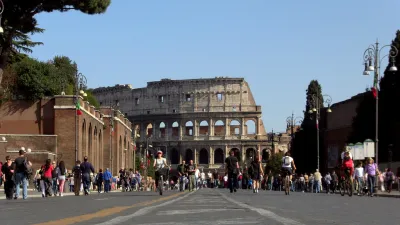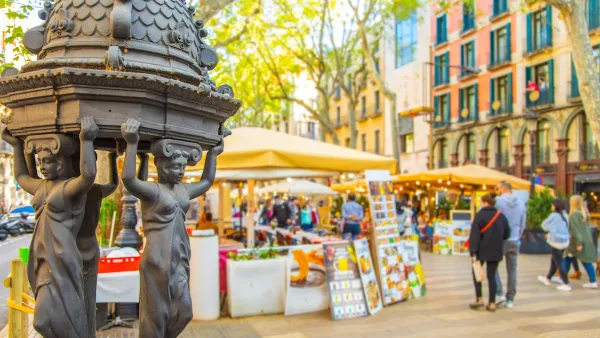Rome's new mayor spent two decades in Philadelphia and Pittsburgh, and he's bringing lessons learned while living car-free in the United States to help solve Rome's traffic problems.

Ignazio Marino was a "distinctive sight" commuting to and from his his job as a transplant surgeon at Thomas Jefferson University Hospital in Philadelphia via red Schwinn. "Even though Marino spent his formative years in cities whose narrow streets encourage walking - Genoa as a child, Rome for medical school - he said it wasn't until he moved to Philadelphia in 2003 that he lived in a city without owning a car," writes Inga Saffron.
When he began campaigning to become the mayor of Rome on promises to "make the car-choked Italian capital a more livable place," it was those experiences in Philadelphia that informed his agenda.
"Unlike Parisians, who have taken to their Velib bike-share system with a vengeance, or Londoners, who have pedestrianized part of Trafalgar Square, he felt Romans had been slow to adopt planning ideas that favor walkers and bicyclists - even though they practically invented the gracious pedestrian plaza."
After closing one central Roman road to nonessential traffic on weekdays and all motorized vehicles on weekends, Marino is looking to add more car-free zones, launch a bike-share program, and expand the city's network of bike lanes.
FULL STORY: Changing Skyline: Former Philadelphian transforms Roman traffic

National Parks Layoffs Will Cause Communities to Lose Billions
Thousands of essential park workers were laid off this week, just before the busy spring break season.

Retro-silient?: America’s First “Eco-burb,” The Woodlands Turns 50
A master-planned community north of Houston offers lessons on green infrastructure and resilient design, but falls short of its founder’s lofty affordability and walkability goals.

Delivering for America Plan Will Downgrade Mail Service in at Least 49.5 Percent of Zip Codes
Republican and Democrat lawmakers criticize the plan for its disproportionate negative impact on rural communities.

Test News Post 1
This is a summary

Test News Headline 46
Test for the image on the front page.

Balancing Bombs and Butterflies: How the National Guard Protects a Rare Species
The National Guard at Fort Indiantown Gap uses GIS technology and land management strategies to balance military training with conservation efforts, ensuring the survival of the rare eastern regal fritillary butterfly.
Urban Design for Planners 1: Software Tools
This six-course series explores essential urban design concepts using open source software and equips planners with the tools they need to participate fully in the urban design process.
Planning for Universal Design
Learn the tools for implementing Universal Design in planning regulations.
EMC Planning Group, Inc.
Planetizen
Planetizen
Mpact (formerly Rail~Volution)
Great Falls Development Authority, Inc.
HUDs Office of Policy Development and Research
NYU Wagner Graduate School of Public Service




























